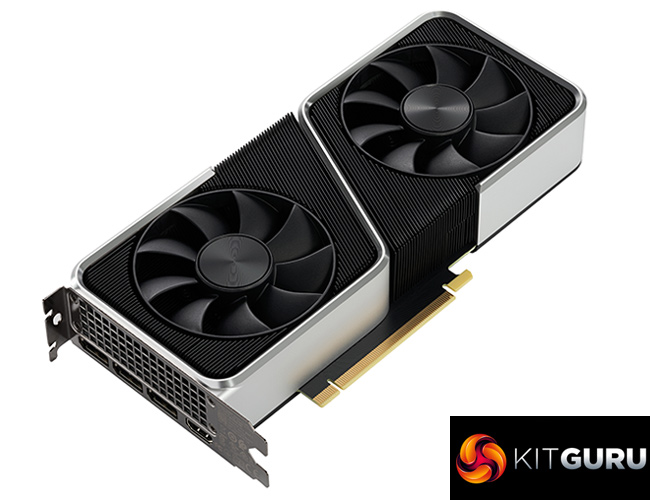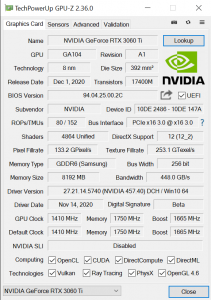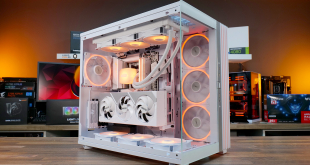
Claimed to be faster than the RTX 2080 Super, today marks the launch of Nvidia's latest Ampere GPU, the RTX 3060 Ti. Priced at £369 here in the UK, the RTX 3060 Ti is the next step down in the 30-series stack, bringing Ampere to its lowest price point yet. Using a cut-down version of the RTX 3070 GPU, it looks tailor-made for a high refresh-rate 1080p or 1440p display, so let's see exactly what this new GPU can deliver.
There's been a succession of GPU launches over the past couple of months, but for the most part the focus has been on the high-end segment – those willing to spend upwards of £500 (or significantly more!) for a new graphics card. With the RTX 3060 Ti, Nvidia is bringing its latest Ampere GPU down into the mid-range, with the MSRP set to £369 here in the UK.
That's exactly £300 less than what the RTX 2080 Super launched for just last year, yet Nvidia isn't shy about claiming the RTX 3060 Ti is the faster GPU. We're also told to expect an uplift of 40% compared to the RTX 2060 Super, which itself launched for £379 in July 2019. Here, we put both claims to the test, looking at 1080p, 1440p and 4K performance over a range of AAA games.
| GPU | RTX 3090 | RTX 3080 | RTX 3070 | RTX 3060 Ti | RTX 2080 SUPER |
| SMs | 82 | 68 | 46 | 38 | 48 |
| CUDA Cores | 10496 | 8704 | 5888 | 4864 | 3072 |
| Tensor Cores | 328 | 272 | 184 | 152 | 384 |
| RT Cores | 82 | 68 | 46 | 38 | 48 |
| Texture Units | 328 | 272 | 184 | 152 | 192 |
| ROPs | 112 | 96 | 96 | 80 | 64 |
| GPU Boost Clock | 1695 MHz | 1710 MHz | 1725 MHz | 1665 MHz | 1815 MHz |
| Memory Data Rate | 19.5 Gbps | 19 Gbps | 14 Gbps | 14 Gbps | 15.5 Gbps |
| Total Video Memory | 24GB GDDR6X | 10GB GDDR6X | 8GB GDDR6 | 8GB GDDR6 | 8GB GDDR6 |
| Memory Interface | 384-bit | 320-bit | 256-bit | 256-bit | 256-bit |
| Memory Bandwidth | 936 GB/Sec | 760 GB/Sec | 448 GB/Sec | 448 GB/Sec | 496.1 GB/sec |
| TGP | 350W | 320W | 220W | 200W | 250W |
The RTX 3060 Ti is the first Ampere GPU to launch which wasn't announced in the September livestream event. Just like the RTX 3070, however, it uses Nvidia’s GA104 GPU, but a cut-down version of that silicon. That means the RTX 3060 Ti incorporates 38 Streaming Multiprocessors (SMs), and thanks to Ampere’s new SM structure with its two FP32 datapaths, each SM houses 128 CUDA cores, giving a total of 4684.
Ampere also places one RT core, and four Tensor cores, in each SM, giving a total of 38 RT cores and 152 Tensor cores. This is accompanied by 152 texture units, and 80 ROPs which are now housed directly within each graphics processing cluster (GPC), with 16 ROPs per GPC, and 5 GPCs in total for RTX 3070.
Clock speed is slightly lower than the RTX 3070. The RTX 3070 Founders Edition has a reference clock of 1725MHz, but the RTX 3060 Ti drops that down to 1665MHz. We test real-world clock speed behaviour later in this review.
For the memory, Nvidia is using the same configuration as the RTX 3070. That means it sports 8GB of 14Gbps GDDR6 memory, operating over a 256-bit bus, for total memory bandwidth of 448 GB/Sec. My particular Founders Edition model uses Samsung G6 memory, but we have also seen Micron memory being used in the past.
Lastly, for total graphics power, Nvidia rates the RTX 3060 Ti for 200W, which is 20W less than the RTX 3070 as a result of its lower core-count and slightly reduced clock speed.
 KitGuru KitGuru.net – Tech News | Hardware News | Hardware Reviews | IOS | Mobile | Gaming | Graphics Cards
KitGuru KitGuru.net – Tech News | Hardware News | Hardware Reviews | IOS | Mobile | Gaming | Graphics Cards




